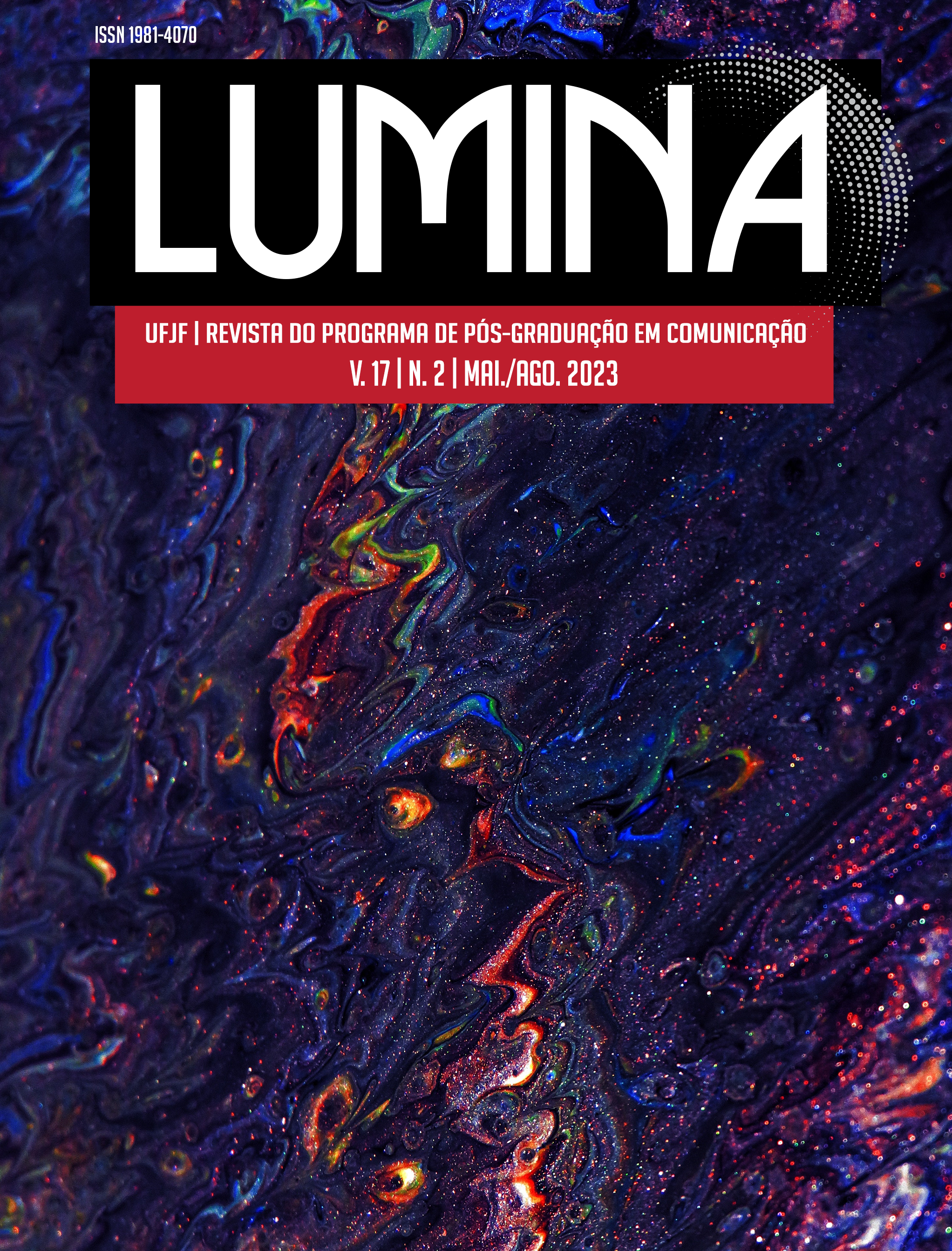Inputs, outputs e feedbacks: a centralidade da memória cibernética em Vilém Flusser
DOI:
https://doi.org/10.34019/1981-4070.2023.v17.40247Keywords:
communication, art, memory, digital culture, historyAbstract
Not with standing the vast collection of diverse topics and problems in Vilém Flusser’s work, the issue of memory functions as a central gateway by means of which one can access all these different problems. The goal of this article is to examine the centrality of the cybernetic notion of memory in Flusser, with a particular emphasis on its implications in art and communication. By understanding culture as a mechanism for the production, processing and consumption of information, the Prague philosopher structures his thinking from the confrontation between repetition and innovation. If art is, for instance, the ongoing production of novelty, it also works as a support for the inscription and transmission of information to future generations. Thereby, the core process of every culture (and of life itself) is fending off entropy. Consequently, memory represents not only a cybernetic requirement, but also a spiritual task, rooted in the Jewish worldview and expressed in the Hebrew word zakhor (“remember”) – the importance of not forgetting the past in order to convey it to future humankind. In Flusser, this commandment becomes a fundamental principle of dialogue and intersubjectivity: “we shall survive in the memory of others”.
Downloads
References
BENJAMIN, W. Magia e técnica, arte e política: ensaios sobre literatura e história da cultura. 8 ed. São Paulo: Brasiliense, 2012, p. 241-252.
BERGERMANN, U. Von Schriften und Schotten: Der Auftritt der Kybernetik in der Medienwissenschaft. Medienwissenschaft, v. 21, n. 1. 2004. p. 28-40. Disponível em: <https://bit.ly/3ObETsG>. Acesso em: 1 ago. 2023.
BOZZI, P. Vilém Flusser: dal soggetto ao progetto, libertà e cultura dei media. UTET: Milano, 2011.
D’UGO JUNIOR; R; BORTULUCCE, V. B. O rádio na estética do futurismo italiano: o manifesto La Radia. Lumen, v. 4, n. 7, p. 69-83, 2019. DOI: <http://dx.doi.org/10.32459/revistalumen.v4i7.97>.
ERNST, W. Das Rumoren der Archive: Ordnung aus Unordnung. Berlim: Merve, 2002.
FELINTO, E.; SANTAELLA, L. O Explorador de Abismos: Vilém Flusser e o Pós-Humanismo. São Paulo: Paulus, 2012.
FLUSSER, V. No além das máquinas. Vilém Flusser Brasil. s/d.-a. Disponível em: <http://flusserbrasil.com/art384.pdf>. Acesso em: 20 out. 2021.
FLUSSER, V. Como explicar a arte - I. Vilém Flusser Brasil. s/d.-b. Disponível em: <http://flusserbrasil.com/art217.pdf>. Acesso em: 20 jun. 2020.
FLUSSER, V. Pós-história: vinte instantâneos e um modo de usar. São Paulo: É Realizações, 2019.
FLUSSER, V. Comunicologia: reflexões sobre o futuro. São Paulo: Martin Fontes, 2014.
FLUSSER, V. Vampyroteuthis Infernalis. São Paulo: Annablume, 2011a.
FLUSSER, V. Filosofia da caixa preta: ensaios para uma futura filosofia da fotografia. São Paulo: Annablume, 2011b.
FLUSSER, V. A Escrita: há futuro para a escrita?. São Paulo: Annablume, 2010.
FLUSSER, V. Kommunikologie weiter denken: Die Bochumer Vorlesungen. Frankfurt am Main: Fischer, 2009.
FLUSSER, V. O universo das Imagens técnicas: elogio da superficialidade. São Paulo, Annablume, 2008.
FLUSSER, V. O mundo codificado: por uma filosofia do design e da comunicação. São Paulo: Cosac Nacify, 2007.
FLUSSER, V. Medienkultur. Frankrut: Fischer, 1999.
FLUSSER, V. Vom Subjekt zum Projekt: Menschwerdug. Frankfurt: Fischer, 1998.
FLUSSER, V. Gesten: Versuch einer Phänomenologie. Düsseldorf: Bollman, 1993.
KITTLER, F. Grammophon, Film, Typewriter. Berlim: Brinkmann & Bose, 1986.
LOVINK, G. Zero Comments: Blogging and Critical Internet Culture. Londres: Routledge, 2007.
MARKS, L. Touch: sensuous theory and multisensory media. Mineápolis: University of Minnesota Press, 2002.
MATUSEK, S. Vilém Flusser und die analog/digital-Differenz innerhalb der Fotografie. Dissertação (Mestrado em Filosofia e Ciência da Cultura/Masterarbeit Philosophie und Bildungswissenschaft) - Universität Wien. Viena, p. 258, 2009. DOI: <https://utheses.univie.ac.at/detail/4700>.
NIETZSCHE, F. Werke in Zwei Bänden (Band I). Munique: Carl Hanser, 1967.
SANTAELLA, L. Por que as comunicações e as artes estão convergindo? São Paulo: Paulus, 2005.
SIMONDON, G. Du mode d’existence des objets techniques. Paris: Aubier, 1989.
YERUSHALMI, Y. H. Zakhor: Jewish History and Jewish Memory. Seattle: University of Washington Press, 1982.
Published
How to Cite
Issue
Section
License
Autores que publicam nesta revista concordam com os seguintes termos:
- Autores mantém os direitos autorais e concedem à revista o direito de primeira publicação, com o trabalho simultaneamente licenciado sob a Licença Creative Commons Attribution que permite o compartilhamento do trabalho com reconhecimento da autoria e publicação inicial nesta revista.
- Autores têm autorização para assumir contratos adicionais separadamente, para distribuição não-exclusiva da versão do trabalho publicada nesta revista (ex.: publicar em repositório institucional ou como capítulo de livro), com reconhecimento de autoria e publicação inicial nesta revista.
- Autores têm permissão e são estimulados a publicar e distribuir seu trabalho online (ex.: em repositórios institucionais ou na sua página pessoal) a qualquer ponto antes ou durante o processo editorial, já que isso pode gerar alterações produtivas, bem como aumentar o impacto e a citação do trabalho publicado (Veja O Efeito do Acesso Livre).








